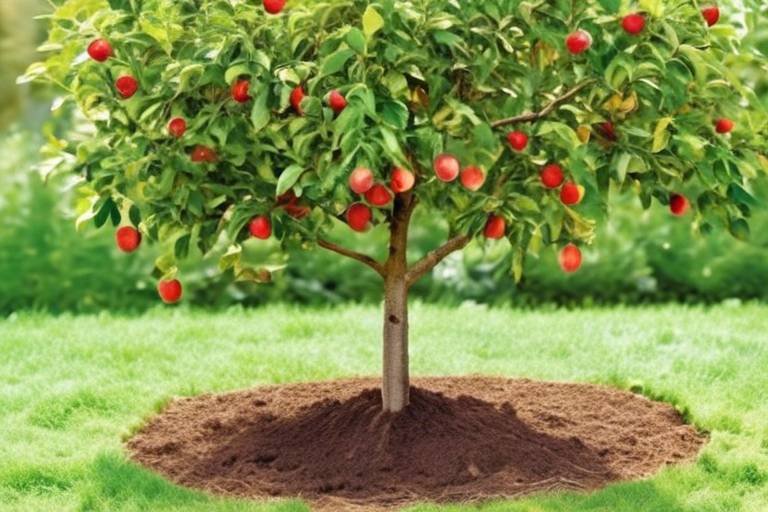Best Tips for Growing Eggplant in Raised Beds
When it comes to growing eggplants in raised beds, there are several key tips that can help you achieve a bountiful harvest. From selecting the right eggplant varieties to proper soil preparation and maintenance, these tips can make a significant difference in the success of your eggplant garden.
One of the first steps in growing eggplants in raised beds is choosing the right varieties. Different eggplant varieties have varying growth habits and fruit characteristics. Consider factors such as size, shape, color, and flavor when selecting the best varieties for your raised bed garden. Popular options include Black Beauty, Japanese Eggplant, and Fairy Tale Eggplant.
Soil preparation is crucial for the health and productivity of your eggplants. Before planting, ensure that your raised bed soil is well-draining, fertile, and rich in organic matter. Incorporating compost, aged manure, and other organic amendments can provide essential nutrients for robust plant growth.
Optimizing sunlight exposure is essential for maximizing the growth and fruiting of eggplants. These sun-loving plants thrive in full sun, so be sure to position your raised beds in a location that receives at least 6-8 hours of direct sunlight per day. Proper sunlight exposure can lead to healthier plants and higher yields.
Watering techniques play a crucial role in the success of your eggplant crop. Overwatering can lead to root rot, while underwatering can cause stress and reduced fruit production. Maintain consistent soil moisture levels by watering deeply and regularly, especially during hot and dry periods.
Managing pests and diseases is another important aspect of growing eggplants in raised beds. Common pests such as aphids, flea beetles, and tomato hornworms can damage your plants, while diseases like powdery mildew and bacterial wilt can affect their health. Implementing integrated pest management strategies and practicing good garden hygiene can help protect your eggplants.
Pruning and supporting your eggplants can improve plant health and fruit quality. Removing excess foliage can increase air circulation and sunlight penetration, reducing the risk of diseases. Staking or using trellises to support the plants can prevent fruit rot and make harvesting easier.
Knowing when and how to harvest your eggplants is crucial for enjoying the best flavor and texture. Harvest ripe eggplants when they are firm, glossy, and reach their mature size. Use a sharp knife or pruning shears to cut the fruit from the plant, leaving a short stem attached. Store harvested eggplants in a cool, dry place to extend their shelf life.
Seasonal care practices and crop rotation are essential for maintaining healthy soil and preventing the buildup of pests and diseases. Rotate your eggplant crop with other unrelated plants each season to reduce the risk of soil-borne diseases and improve soil fertility. Consider planting cover crops during the off-season to enrich the soil and suppress weeds.
By following these expert tips for growing eggplants in raised beds, you can cultivate a thriving garden full of delicious and nutritious fruits. With careful planning and maintenance, you can enjoy a successful eggplant harvest year after year.

Choosing the Right Eggplant Varieties
When it comes to choosing the right eggplant varieties for your raised bed garden, there are several factors to consider to ensure a successful harvest. Different eggplant varieties offer unique characteristics in terms of size, shape, color, and flavor. Some varieties are more suited for specific growing conditions, so selecting the right one can make a significant difference in your gardening experience.
One popular eggplant variety is the classic Black Beauty, known for its deep purple color and versatile culinary uses. This variety is a reliable choice for beginners and experienced gardeners alike, as it produces well in various climates and soil conditions. Its glossy skin and firm texture make it ideal for grilling, roasting, or frying.
For those looking to add a pop of color to their garden, the Listada de Gandia variety is a visually striking option. With its purple and white striped skin, this eggplant variety not only adds aesthetic appeal to your raised beds but also offers a delicate flavor that is perfect for fresh salads or sautéing.
If you prefer a smaller eggplant variety that is perfect for individual servings or container gardening, the Patio Baby eggplant is an excellent choice. These compact plants produce small, round fruits with a mild flavor, making them ideal for growing in limited spaces or on patios and balconies.
When selecting eggplant varieties for your raised beds, consider factors such as the size of the mature plant, fruit shape, and your preferred culinary uses. Experimenting with different varieties can add diversity to your garden and culinary creations, allowing you to explore the unique flavors and textures that each type of eggplant offers.

Preparing the Raised Bed Soil
When it comes to preparing the soil in your raised bed for optimal eggplant growth, there are several key steps to follow. The first step is to clear the area of any weeds or debris that could hinder the development of your eggplants. Once the bed is clear, it's important to assess the quality of the soil and make any necessary amendments to ensure it is nutrient-rich and well-draining.
One effective way to improve the soil quality is by adding organic matter such as compost or well-rotted manure. These materials not only provide essential nutrients for plant growth but also help improve soil structure, allowing for better root penetration and water retention. Mixing in these organic amendments thoroughly will create a fertile environment for your eggplants to thrive.
Additionally, consider testing the pH level of the soil to ensure it falls within the optimal range for eggplant growth, which is typically slightly acidic to neutral. Adjusting the pH if necessary can prevent nutrient deficiencies and promote healthy plant development.
Creating a raised bed soil mix that is well-balanced in nutrients and texture is crucial for the success of your eggplant crop. A good mix might consist of a combination of topsoil, compost, peat moss, and perlite to provide adequate drainage and aeration for the roots. Ensuring proper soil structure will support healthy root growth and overall plant vigor.
Remember that the soil in raised beds can dry out more quickly than traditional garden beds, so it's essential to monitor moisture levels regularly and water as needed. Mulching the soil surface can help retain moisture and regulate temperature, creating a more stable environment for your eggplants to thrive.

Optimizing Sunlight Exposure
Optimizing sunlight exposure is crucial for the successful growth of eggplants in raised beds. These sun-loving plants thrive in full sunlight, requiring at least 6-8 hours of direct sunlight daily. When positioning your raised beds, consider placing them in a location where they can receive ample sunlight throughout the day.
One effective way to optimize sunlight exposure is to orient your raised beds in a north-south direction. This orientation allows the plants to receive sunlight evenly on all sides, promoting uniform growth and fruit development. Additionally, avoid planting tall crops or placing structures that may cast shadows over the eggplants and block sunlight.
For gardeners facing challenges with limited sunlight in their gardening space, consider using reflective materials to redirect and enhance sunlight exposure. Reflective mulches or surfaces can help bounce light back onto the plants, maximizing the available sunlight for optimal growth.
Regularly monitor the sunlight patterns in your garden to ensure that the eggplants are receiving the required amount of sunlight. Adjust the positioning of your raised beds or make use of shade cloth to provide partial shade if the plants are experiencing excessive heat and sunlight stress.
By strategically optimizing sunlight exposure for your eggplants in raised beds, you can create an ideal growing environment that promotes healthy plant development and abundant fruit production.

Watering Techniques for Eggplants
When it comes to watering your eggplants in raised beds, finding the right balance is crucial for their overall health and productivity. Overwatering can lead to root rot and other issues, while underwatering can result in stunted growth and poor fruit development. So, how can you ensure that your eggplants receive just the right amount of water?
One effective technique is to water deeply but infrequently. This means providing a thorough watering session that penetrates the soil deeply, encouraging the roots to grow downward in search of moisture. However, you should allow the soil to dry out slightly between watering to prevent waterlogging.
Another essential aspect of watering eggplants is maintaining consistent moisture levels. Eggplants prefer evenly moist soil, so it's important to monitor the moisture content regularly. Consider using a moisture meter to determine when it's time to water again, ensuring that the soil is neither too dry nor too wet.
Moreover, watering at the base of the plants is recommended to avoid wetting the foliage, which can lead to fungal diseases. By directing the water towards the roots, you help prevent issues such as blossom end rot and maintain a healthier growing environment for your eggplants.
During hot and dry periods, mulching around your eggplants can help retain soil moisture and reduce water evaporation. Organic mulches like straw or shredded leaves not only conserve moisture but also contribute to soil health as they decompose over time.
Lastly, observing your plants for signs of water stress is essential in adjusting your watering schedule. Wilting, yellowing leaves, and slow growth are indicators that your eggplants may need more water. By paying attention to these cues, you can fine-tune your watering techniques for optimal plant health.

Managing Pests and Diseases
When it comes to in your eggplant raised beds, proactive measures are key to ensuring a healthy crop. Pests such as aphids, flea beetles, and spider mites can wreak havoc on your eggplants, while diseases like powdery mildew and bacterial wilt can quickly spread and damage your plants. Implementing organic pest management techniques is not only effective but also environmentally friendly.
One strategy to manage pests is to encourage natural predators like ladybugs and lacewings that feed on harmful insects. You can also companion plant herbs such as basil and marigolds, which act as natural repellents against pests. Additionally, regularly inspecting your plants for any signs of infestation and promptly addressing any issues can help prevent pest populations from getting out of control.
When it comes to diseases, prevention is key. Avoid overhead watering to reduce the risk of fungal infections, and ensure proper spacing between plants to promote air circulation. Applying organic fungicides preventatively can also help protect your eggplants from common diseases.
In cases where pests or diseases do appear, it's important to take swift action. Neem oil and diatomaceous earth are natural remedies that can effectively control pests without harming beneficial insects or the environment. For diseases, removing and disposing of infected plant parts can help prevent the spread to healthy plants.

Pruning and Supporting Eggplants
When it comes to growing healthy and productive eggplants in raised beds, proper pruning and supporting techniques play a crucial role. Pruning involves removing excess foliage and non-fruiting branches to improve air circulation, sunlight exposure, and overall plant health. This practice not only helps in preventing diseases by reducing humidity levels but also directs the plant's energy towards fruit development.
Supporting your eggplants is equally important, especially as they start to bear fruit. Using stakes or cages can prevent the heavy fruit-laden branches from bending or breaking, ensuring that your plants grow upright and produce high-quality eggplants. Additionally, supporting structures help in maintaining the plant's shape and making harvesting easier.
Consider creating a simple support system using stakes or tomato cages to keep your eggplants upright and well-aerated. This not only promotes better fruit quality but also makes it easier to inspect and harvest your eggplants. Remember to tie the plants gently to the support structures using soft ties to avoid damaging the stems.

Harvesting and Storing Eggplants
When it comes to harvesting and storing eggplants, timing is key to ensuring the best flavor and texture. Eggplants are ready to be picked when they reach a mature size and have a glossy appearance. Use a sharp knife or pruning shears to cut the eggplants from the plant, leaving a short stem attached. Avoid pulling or twisting the fruit, as this can damage the plant.
After harvesting, it's important to store eggplants properly to maintain their freshness. Store unwashed eggplants in a cool, dry place or in the refrigerator for up to a week. To prevent moisture loss, wrap the eggplants in a paper towel or place them in a perforated plastic bag before refrigerating. Avoid storing eggplants near fruits that produce ethylene gas, such as tomatoes and bananas, as this can cause them to ripen too quickly.
If you have a bountiful harvest and want to preserve your eggplants for longer storage, consider freezing or canning them. To freeze eggplants, blanch the sliced or cubed fruit in boiling water for a few minutes, then plunge them into ice water to stop the cooking process. Drain the eggplants and pack them into airtight containers or freezer bags before placing them in the freezer. Canned eggplants can be prepared by pickling or canning in brine or vinegar solutions for long-term storage.

Seasonal Care and Crop Rotation
Seasonal care and crop rotation are vital aspects of successful eggplant cultivation in raised beds. By understanding the seasonal needs of your plants and implementing proper crop rotation techniques, you can maintain healthy soil and prevent the buildup of pests and diseases.
During the different seasons, eggplants have varying requirements that need to be addressed. In the spring, focus on preparing the soil and planting your eggplants in a well-drained raised bed with ample sunlight. As summer approaches, ensure consistent watering and monitor for any signs of pests or diseases that may emerge in the warm weather.
When fall arrives, it's essential to start planning for crop rotation. Rotating your eggplant crop with other vegetables can help break the cycle of pests and diseases specific to eggplants. Consider planting legumes or leafy greens in place of eggplants to replenish the soil with nutrients and disrupt potential pest habitats.
Additionally, incorporating cover crops during the winter months can protect the soil from erosion and enrich it with organic matter. Cover crops like clover or vetch can fix nitrogen in the soil, preparing it for the next eggplant growing season.
By following a seasonal care schedule and practicing crop rotation, you can ensure the long-term health and productivity of your raised bed eggplant garden.
Frequently Asked Questions
- What are the best eggplant varieties for raised bed gardening?
There are several eggplant varieties that thrive in raised beds, including Black Beauty, Japanese Long, and Fairy Tale. These varieties are known for their adaptability to container and raised bed gardening, producing high yields of delicious eggplants.
- How often should I water my eggplants in raised beds?
Eggplants in raised beds require consistent moisture to thrive. It is recommended to water deeply once or twice a week, ensuring the soil is evenly moist but not waterlogged. Adjust watering frequency based on weather conditions to prevent overwatering or underwatering.
- What are the common pests and diseases that affect eggplants?
Common pests that can target eggplants include aphids, flea beetles, and spider mites. Diseases such as powdery mildew and bacterial wilt can also impact eggplant health. Implementing proper pest management practices and maintaining good soil health can help prevent infestations.
- When is the best time to harvest eggplants?
Eggplants are best harvested when they reach a mature size and have a glossy sheen. Use a sharp knife or pruners to cut the fruit from the plant, ensuring not to damage the stems. Harvest regularly to encourage continuous fruit production throughout the growing season.



















